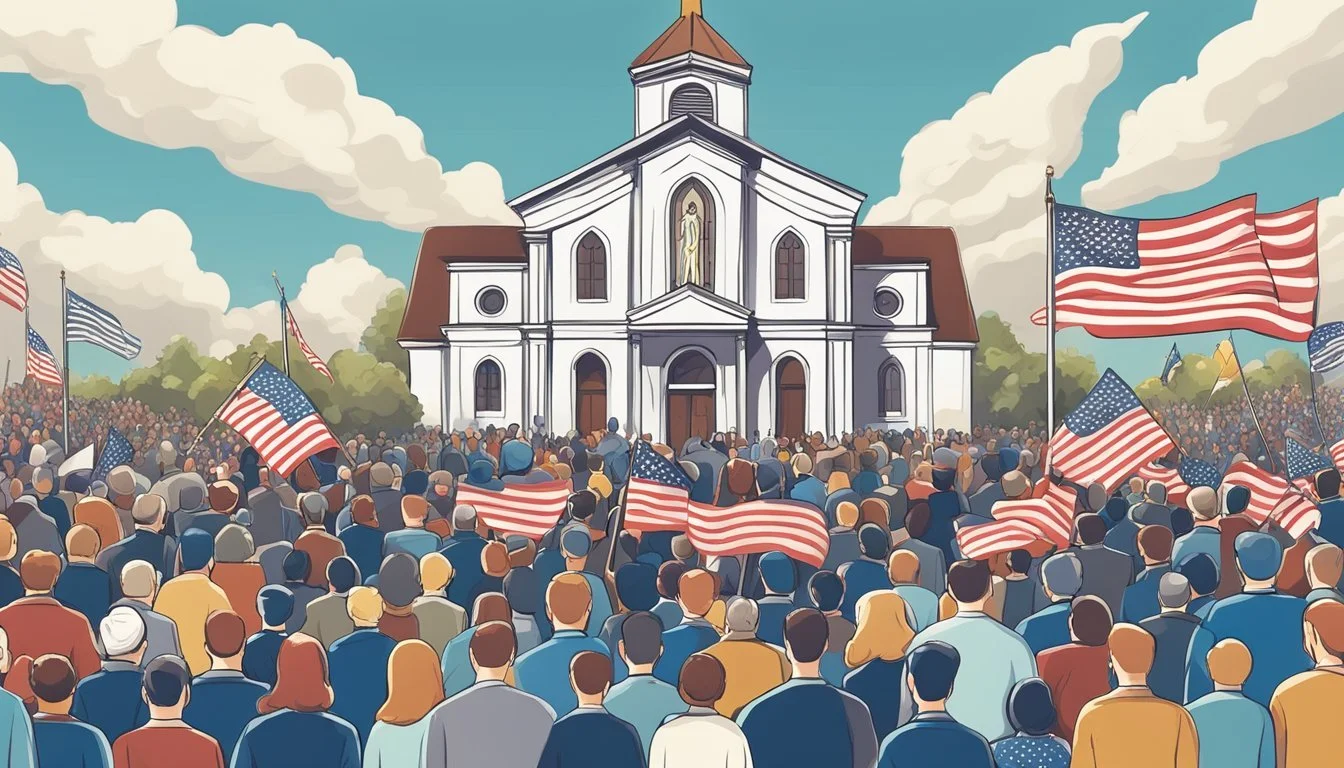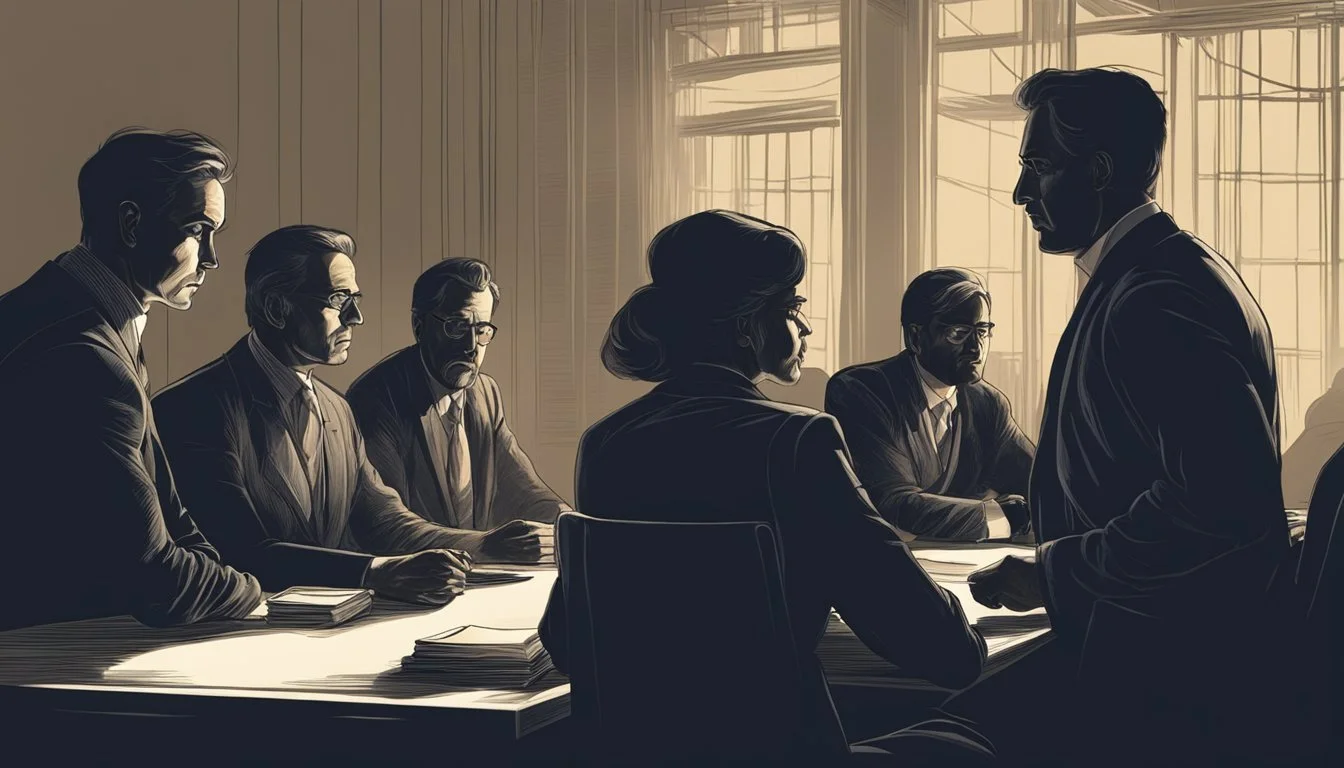God's Pawns: How Christian Nationalists Hijacked American Democracy
The "Bad Faith" documentary sheds light on a powerful movement shaping American politics. Released in 2024, this film examines the rise of Christian Nationalism and its impact on democracy in the United States. The documentary traces the origins of this ideology back to the 1960s, revealing how it has evolved into a significant force in contemporary American society.
Featuring interviews with experts and insiders, "Bad Faith" explores how Christian Nationalist leaders have leveraged fear and anger to advance their agenda. The film delves into the movement's connection to organizations like the Council for National Policy and its influence on major political events. From the Moral Majority to the Trump presidency and the January 6 Capitol attack, the documentary presents a comprehensive look at the movement's trajectory.
"Bad Faith" serves as a call to action, highlighting the potential threats Christian Nationalism poses to American democratic institutions. The film aims to educate viewers about this often-misunderstood ideology and its far-reaching implications for the nation's future. By examining the historical context and current manifestations of Christian Nationalism, "Bad Faith" offers a timely analysis of a movement that continues to shape American politics and society.
Overview of Bad Faith in American Politics
Bad faith in American politics refers to deceptive or dishonest practices that undermine democratic principles. This concept has played a significant role in shaping political discourse and policy decisions throughout U.S. history.
Definition and Significance
Bad faith in politics involves intentionally misleading or deceiving others for political gain. It can manifest as false promises, deliberate misrepresentation of facts, or hidden agendas.
This practice erodes trust in political institutions and processes. It can lead to voter disillusionment and apathy, weakening the foundations of democratic participation.
Bad faith tactics often exploit emotional responses rather than appealing to reason. This approach can polarize the electorate and hinder constructive dialogue on important issues.
Historical Context
Bad faith has been present in American politics since the nation's founding. Early examples include the use of propaganda during the Revolutionary War and partisan conflicts in the early republic.
The 20th century saw a rise in sophisticated bad faith techniques. Political spin and media manipulation became more prevalent, especially during the Cold War era.
Recent decades have witnessed an intensification of bad faith practices. The advent of social media and 24-hour news cycles has created new avenues for spreading misinformation.
Impact on Political Landscape
Bad faith tactics have significantly shaped modern American politics. They have contributed to increased partisanship and gridlock in government.
These practices have affected policy outcomes on crucial issues like healthcare, climate change, and economic policy. Misinformation campaigns have swayed public opinion and influenced voting behavior.
The rise of "fake news" and conspiracy theories has further complicated political discourse. This has made it challenging for citizens to discern truth from fiction in political debates.
Bad faith practices have also impacted international relations, affecting America's standing on the global stage. They have sometimes led to strained diplomatic ties and reduced trust in U.S. leadership.
Origins of Christian Nationalism in America
Christian nationalism in America has deep roots stretching back to the nation's founding. It combines elements of religious belief with political ideology to promote the idea of the United States as a distinctly Christian nation.
Theological Foundations
Christian nationalism draws on interpretations of biblical texts and American history that portray the U.S. as divinely ordained. Proponents often cite the religious beliefs of the Founding Fathers and early settlers as evidence for this view.
Some adherents see America as a "New Israel" with a special covenant relationship with God. This belief system emphasizes Protestant Christianity as central to American identity and values.
Rise in the Political Realm
Christian nationalism gained significant political traction in the late 20th century. Key figures like Paul Weyrich and Jerry Falwell Sr. played pivotal roles in mobilizing conservative Christians as a voting bloc.
The Moral Majority, founded in 1979, marked a turning point. It effectively linked evangelical Christians with conservative political causes. This alliance reshaped the Republican Party and American politics more broadly.
Christian nationalist ideas have since become influential in policy debates around issues like abortion, LGBTQ+ rights, and religious freedom. Critics argue this movement threatens the separation of church and state.
The Council for National Policy
The Council for National Policy is a secretive conservative organization that has played a significant role in shaping right-wing politics and policy in the United States. Founded in 1981, it has become a powerful force in promoting Christian nationalist ideals and influencing Republican Party positions.
Founding and Philosophy
Paul Weyrich, a conservative political activist, founded the Council for National Policy in 1981. The organization was established as a networking platform for conservative leaders, including politicians, religious figures, and wealthy donors. Its core philosophy centers on promoting traditional Christian values in government and society.
The Council operates with a high level of secrecy, holding closed-door meetings and rarely disclosing its membership list. This approach allows for frank discussions and strategic planning among its influential members.
The organization's goals include advancing socially conservative policies, opposing secular influences, and supporting a limited government aligned with their interpretation of Christian principles.
Influence on Policy
The Council for National Policy has exerted significant influence on Republican Party policies and conservative movements. Its members have played key roles in shaping party platforms and selecting political candidates who align with their values.
The organization has been instrumental in:
Mobilizing evangelical voters
Promoting conservative judicial appointments
Advocating for school choice and religious education
Opposing LGBTQ+ rights and abortion access
Through its extensive network, the Council has successfully pushed for policy changes at both state and federal levels. Its members have held positions in Republican administrations, further amplifying their impact on government decisions.
The Council's influence extends beyond direct policy-making. It has been credited with coordinating messaging strategies among conservative media outlets and think tanks, creating a unified front on key issues.
Notable Figures in Christian Nationalism
Christian nationalism has been shaped by influential leaders and activists who have played key roles in advancing the movement's goals. These figures have contributed to its growth through political activism and ideological development.
Political Activists and Leaders
Jerry Falwell Sr. emerged as a prominent figure in Christian nationalism. He founded the Moral Majority in 1979, mobilizing conservative Christians for political action. Falwell's efforts helped forge alliances between evangelical Christians and the Republican Party.
Other notable leaders include Pat Robertson, founder of the Christian Broadcasting Network, and James Dobson, founder of Focus on the Family. These individuals used media platforms to spread their message and influence policy.
More recently, figures like Tony Perkins of the Family Research Council and Franklin Graham have continued to advocate for Christian nationalist ideals in the political sphere.
Contributions to the Movement
Christian nationalist leaders have made significant contributions to shaping the movement's ideology and strategies. They have:
Developed theological justifications for merging Christian identity with American nationalism
Created networks of churches and organizations to mobilize voters
Lobbied for policies aligning with their interpretation of Christian values
Utilized media outlets to spread their message and recruit followers
Jerry Falwell Jr., following in his father's footsteps, expanded Liberty University's influence as a center for conservative Christian education. This institution has played a role in training future leaders sympathetic to Christian nationalist ideas.
The Documentary Genre
Documentaries aim to inform and educate audiences about real-world subjects through factual storytelling. They employ various techniques to engage viewers and present complex topics in accessible ways.
Characteristics of Political Documentaries
Political documentaries often tackle controversial issues and current events. They frequently use interviews with experts, archival footage, and narration to build their arguments. These films may present multiple viewpoints or advocate for specific positions.
Some political documentaries incorporate dramatic reenactments to illustrate historical events. Others rely on observational footage to capture real-time developments. Graphics and animations can help explain complex concepts.
Many political documentaries strive for journalistic objectivity, while others openly embrace advocacy. Filmmakers must navigate ethical considerations around representation and bias.
Influence on Public Opinion
Documentaries can shape public discourse on important issues. High-profile films may generate media coverage and spark debates. Some documentaries have influenced policy decisions or inspired grassroots activism.
Critics argue that documentaries can oversimplify complex topics or present skewed perspectives. Audiences should approach these films critically and seek out additional sources.
The rise of streaming platforms has expanded the reach of documentaries. This increased accessibility allows niche topics to find audiences. Social media also enables documentaries to spread virally and reach new viewers.
Impact of Trump Administration
The Trump administration significantly influenced the rise of Christian nationalism in America. Its policies and rhetoric emboldened certain religious groups while raising concerns about the separation of church and state.
Policies and Rhetoric
Trump's appointment of conservative judges and vocal support for evangelical causes resonated with Christian nationalists. His administration implemented policies aligning with their views, such as restricting abortion access and promoting "religious liberty" initiatives.
Trump's rhetoric frequently invoked religious imagery and positioned himself as a defender of Christianity. This approach strengthened his bond with evangelical supporters and fueled Christian nationalist sentiment.
The administration's immigration policies, particularly the travel ban affecting several Muslim-majority countries, were praised by some Christian nationalist groups as protecting America's "Christian identity."
Long-Term Effects
The Trump era's embrace of Christian nationalist ideals has had lasting impacts on American politics and society. It normalized previously fringe religious-political views in mainstream discourse.
Many Christian nationalists now view political engagement as a religious duty. This has led to increased mobilization and organization of these groups, even after Trump left office.
The documentary "Bad Faith" suggests that emboldened Christian nationalists could become key supporters in a potential future Trump presidency, raising concerns about further erosion of church-state separation.
The movement's growth has sparked counterreactions, with increased scrutiny and opposition from those concerned about threats to American democracy and religious pluralism.
Challenges to Democracy
The Bad Faith documentary highlights significant threats to American democracy posed by Christian nationalism. This movement seeks to reshape governance and society according to a particular religious ideology.
Present-Day Concerns
Christian nationalist groups exert substantial influence over policy and elections. They promote candidates who pledge to enact laws based on their interpretation of Christian values. This challenges the separation of church and state.
These organizations often spread disinformation about election integrity. Such claims undermine public trust in democratic processes and institutions.
Some Christian nationalist leaders advocate for restricting voting rights. They support measures that disproportionately impact minority communities.
The movement pushes for laws that could infringe on individual freedoms. These include efforts to limit LGBTQ+ rights and restrict access to reproductive healthcare.
Future Outlook
If left unchecked, Christian nationalism could further erode democratic norms. There are concerns about potential impacts on future elections and policy-making.
Some experts warn of increased political polarization. This could make compromise and effective governance more difficult.
There's potential for escalating conflicts over religious freedom. Non-Christians and secular Americans may face discrimination or marginalization.
However, increased awareness of these issues may lead to pushback. Pro-democracy groups are mobilizing to counter Christian nationalist influence.
Civic education initiatives aim to strengthen democratic values. These efforts focus on promoting pluralism and constitutional principles.




